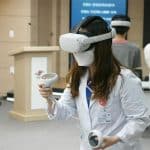March 29, 2021
Denis Mizne is the chief executive officer of the Lemann Foundation, an organisation striving to make Brazil a more just and equitable society through guaranteeing access to high-quality public education for Brazilians of all backgrounds

Please can you introduce yourself and your role?
I am the chief executive officer of the Lemann Foundation. Our core belief is that Brazil will only advance if we give our people the means to fully realise their potential. To do that, we invest in two crucial areas: improving public education and supporting social leaders and organisations who are dedicating their lives to positively impacting our country.
Before joining the Lemann Foundation, I founded Sou da Paz in 1997, an organisation committed to reducing gun violence in Brazil.
How has the Lemann Foundation helped Brazilian students during the pandemic?
In Brazil, more than 180,000 schools had to close because of COVID. The pandemic represented a serious threat to education, and it was clear that until the virus was contained, progress on education would be impossible and many gains already made would be reversed. Only 39.4% of households have access to a home computer and 14% of schools in the urban public school network had some kind of online education before COVID. It was therefore essential to invest in remote learning initiatives, but we had to get creative as no single solution could serve all students.
Under our #PeloFutureAgora (‘For the future now’) initiative, the Lemann Foundation coordinated efforts with civil society and state and municipal government representatives to deliver education to as many children as possible, across a range of platforms.
For example, thanks to AprendiZap, nearly 150,000 children were able to access remote learning materials via WhatsApp. Another initiative was Aprendendo Sempre (which means ‘Always Learning’), a website that consolidates high-quality educational resources from various platforms. The materials are picked by teachers and learning experts and cover all major subjects. The website has received over 120,000 visits. We also set up a YouTube channel, YouTubeEdu, for which we curated the highest quality online video teaching content, organised by grade and subject. The channel has more than 465,000 subscribers. For children without internet access at home, we helped set up Vamos Aprender (this translates to ‘Let’s Learn’), which makes quality educational content available for free to states and municipalities, ready to be broadcast on television. So far, the programme has benefited 12 million children.
It was also important for us to support teachers, so we created the Fundo de Apoio à Aprendizagem (which means ‘Support Fund for Learning’) alongside Imaginable Futures. Through this fund, we helped Amplifica, an edtech company, build digital materials covering learning experiences mediated by technology. Their team developed approximately 700 active learning experiences, online and offline, co-created with 40 teachers, enough content to cover eight weeks of class. All content produced was available free of charge, targeting students aged 6 to 15. It was hosted on the Simplifica Portal and included features like connecting with Google Classroom or printer-friendly options. Teachers from across Brazil had access to the materials, using different setups, including more than 37,000 users who registered through the Simplifica portal.
In total, our #PeloFuturoAgora programme has benefited nearly a quarter of Brazilian children – more than 13 million students.
RECOMMENDED: https://global-edtech.com/category/community/

Do you think these initiatives are sustainable?
In a moment of crisis, we were able to mitigate the impact of the pandemic on children’s learning, but ultimately it is important to find ways to return in-person learning.
Between May and November 2020, the Lemann Foundation surveyed parents and guardians throughout Brazil. 65% said that school closures will compromise pre-school children’s development, and 58% believed isolation will cause emotional problems in adolescents. The survey also revealed that around one-third of students are at risk of giving up their studies. I do believe, however, that our programmes are helping to strengthen contact between families and schools. Parents can see more clearly the key role that school plays in their children’s development, and I hope this will motivate them to prevent school dropouts.
Like many other countries, Brazil is now trying to determine the safest way to reopen schools. We are working with 44 municipalities and nine states to design and implement plans to ensure roughly 2.1 million students can return to the classroom.
We have been working alongside other organisations to assist teachers and school systems to prepare for the reopening of schools. We are one of the organisations behind the creation of the Plataforma de Apoio à Aprendizagem (which translates to ‘Platform to Support Learning’), an online platform for teachers and school managers with guidelines for reopening, as well as assessment activities to help teachers plan lessons according to their students’ needs. We also supported the creation of Escola Segura (which translates to ‘Safe School’), in which school and district managers can simulate school reopenings and access recommendations on safety and the maximum number of students allowed per classroom, among others.
Are the Lemann Foundation involved in other educational projects in Brazil or the region?
One project I am particularly excited about is our Creative Schools Program, which has just received $4 million in funding from the LEGO Foundation. It is based on the idea that play is essential to children’s learning. We are working with the Massachusetts Institute of Technology, Tufts University and The Tinkering Studio at the Exploratorium in California. Our goal is to incorporate more creative, hands-on learning experiences through technology and simple recyclable materials such as paper and cardboard. The programme is being rolled out across 20 of Brazil’s school systems and is set to benefit 500,000 students. Creativity is an increasingly important skill in the modern world, and we hope to make creative learning a central feature of the Brazilian education system.
This programme builds upon the Lemann Foundation’s work to establish National Learning Standards in Brazil. We were so proud when they came into effect last year – and we were lucky they did. It was just before the start of the pandemic, so having clear guidelines in place on what student should be learning meant that we were able to create learning content that was suitable for children in every school in the country.
What are the greatest challenges that Brazil faces when it comes to education and deploying edtech?
Educational inequality is rife in Brazil. Even before the pandemic, almost half of Brazilian 8-year-olds struggled with reading. Only 29% of public primary schools and 61% of public secondary schools have internet access. Unfortunately, school closures have disproportionately impacted low-income students and risk exacerbating inequalities.
Our research found that the pandemic could set students’ learning back as much as four years. We were able to develop incredible edtech tools to help children keep up with their learning. The problem is making sure those tools reach as many students as possible, especially the most vulnerable.
As I mentioned, less than half of Brazilian households have access to a home computer and very few schools used online learning. More than half (58%) of schools with internet access are limited to speeds of 2mbps. That is why we helped develop the Connected Education Meter, which records internet speeds on school computers every four hours. This tool provides policy-makers with the most up to date information on where they need to focus resources to boost connectivity. The number of schools using the Connected Education Meter has grown from 3,000 to 27,000. I hope soon we can map the connectivity in all of Brazil’s public schools. Of course, this problem is not unique to Brazil. One of the Sustainable Development Goals is to ensure equitable access to quality education, and internet access is crucial in this regard.













